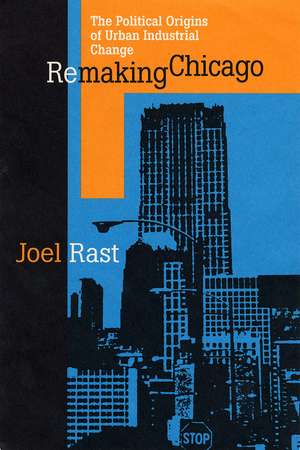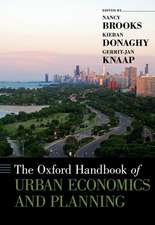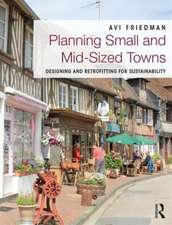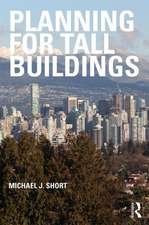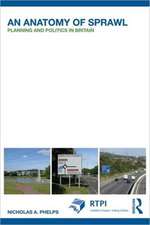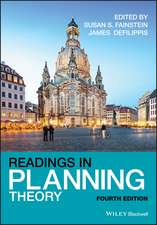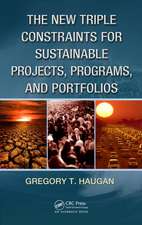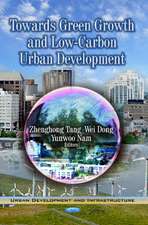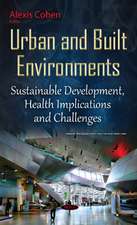Remaking Chicago: The Political Origins of Urban Industrial Change
Autor Joel Rasten Limba Engleză Paperback – 11 iul 2002
Examining Chicago as a model for urban economic development in the post–World War II era, Joel Rast challenges the conventional belief that structural economic change has forced cities to concentrate resources on downtown revitalization efforts in order to remain fiscally viable. Rast argues instead that cities face multiple economic development choices and that politics play a fundamental role in deciding among them.
During the late 1950s, a coalition of city officials and downtown business leaders initiated planning efforts that would help reshape central Chicago into a modern mecca of service industries and affluent residential neighborhoods, chasing viable manufacturers from the near downtown area in the process. More recently, however, manufacturers have sought protection and support from city government, forming alliances with labor and community organizations concerned with the decline of well-paying industrial job opportunities. Responding to these pressures, city officials from the Harold Washington, Eugene Sawyer, and Richard M. Daley administrations have taken steps to implement a citywide industrial policy.
Remaking Chicago portrays urban economic development as open-ended and politically contested. It demonstrates that who governs matters and shows how opportunities exist for creative local responses to urban economic restructuring. Based on extensive research, this well-written case study will appeal to those interested in urban planning and politics, economic development, and Chicago history and politics.
During the late 1950s, a coalition of city officials and downtown business leaders initiated planning efforts that would help reshape central Chicago into a modern mecca of service industries and affluent residential neighborhoods, chasing viable manufacturers from the near downtown area in the process. More recently, however, manufacturers have sought protection and support from city government, forming alliances with labor and community organizations concerned with the decline of well-paying industrial job opportunities. Responding to these pressures, city officials from the Harold Washington, Eugene Sawyer, and Richard M. Daley administrations have taken steps to implement a citywide industrial policy.
Remaking Chicago portrays urban economic development as open-ended and politically contested. It demonstrates that who governs matters and shows how opportunities exist for creative local responses to urban economic restructuring. Based on extensive research, this well-written case study will appeal to those interested in urban planning and politics, economic development, and Chicago history and politics.
| Toate formatele și edițiile | Preț | Express |
|---|---|---|
| Paperback (1) | 229.18 lei 6-8 săpt. | |
| Northern Illinois University Press – 11 iul 2002 | 229.18 lei 6-8 săpt. | |
| Hardback (1) | 721.20 lei 6-8 săpt. | |
| Northern Illinois University Press – 3 mai 1999 | 721.20 lei 6-8 săpt. |
Preț: 229.18 lei
Nou
Puncte Express: 344
Preț estimativ în valută:
43.85€ • 47.78$ • 36.95£
43.85€ • 47.78$ • 36.95£
Carte tipărită la comandă
Livrare economică 23 aprilie-07 mai
Preluare comenzi: 021 569.72.76
Specificații
ISBN-13: 9780875805931
ISBN-10: 0875805930
Pagini: 216
Dimensiuni: 152 x 229 x 15 mm
Greutate: 0.37 kg
Ediția:1
Editura: Northern Illinois University Press
Colecția Northern Illinois University Press
ISBN-10: 0875805930
Pagini: 216
Dimensiuni: 152 x 229 x 15 mm
Greutate: 0.37 kg
Ediția:1
Editura: Northern Illinois University Press
Colecția Northern Illinois University Press
Recenzii
"Insightful ... Rast clearly proves his thesis and makes a significant contribution to the field of urban politics."—American Political Science Review
"Rast mines the rich vein of studies of postwar development practices in downtown Chicago in order to form his critical reassessment of urban development theory."—APA Journal
"The knowledge [Rast] generated adds substantially to what is known about Chicago during one of the most sweeping and contentious periods of urban restructuring."—Urban Studies
"Rast mines the rich vein of studies of postwar development practices in downtown Chicago in order to form his critical reassessment of urban development theory."—APA Journal
"The knowledge [Rast] generated adds substantially to what is known about Chicago during one of the most sweeping and contentious periods of urban restructuring."—Urban Studies
Cuprins
Table of Contents1 The Politics of Urban Economic Development
2 Downtown Redevelopment and the Chicago Political Machine
3 Rethinking Industrial Decline: The Chicago Printing and Apparel Industries
4 Community Economic Development and the Crisis of Machine Politics
5 The Battle for the Near North Side
6 Toward a Citywide Industrial Policy
Notes
Bibliography
Index
2 Downtown Redevelopment and the Chicago Political Machine
3 Rethinking Industrial Decline: The Chicago Printing and Apparel Industries
4 Community Economic Development and the Crisis of Machine Politics
5 The Battle for the Near North Side
6 Toward a Citywide Industrial Policy
Notes
Bibliography
Index
Descriere
Examining Chicago as a model for urban economic development in the post–World War II era, Joel Rast challenges the conventional belief that structural economic change has forced cities to concentrate resources on downtown revitalization efforts in order to remain fiscally viable. Rast argues instead that cities face multiple economic development choices and that politics play a fundamental role in deciding among them.
During the late 1950s, a coalition of city officials and downtown business leaders initiated planning efforts that would help reshape central Chicago into a modern mecca of service industries and affluent residential neighborhoods, chasing viable manufacturers from the near downtown area in the process. More recently, however, manufacturers have sought protection and support from city government, forming alliances with labor and community organizations concerned with the decline of well-paying industrial job opportunities. Responding to these pressures, city officials from the Harold Washington, Eugene Sawyer, and Richard M. Daley administrations have taken steps to implement a citywide industrial policy.
Remaking Chicago portrays urban economic development as open-ended and politically contested. It demonstrates that who governs matters and shows how opportunities exist for creative local responses to urban economic restructuring. Based on extensive research, this well-written case study will appeal to those interested in urban planning and politics, economic development, and Chicago history and politics.
During the late 1950s, a coalition of city officials and downtown business leaders initiated planning efforts that would help reshape central Chicago into a modern mecca of service industries and affluent residential neighborhoods, chasing viable manufacturers from the near downtown area in the process. More recently, however, manufacturers have sought protection and support from city government, forming alliances with labor and community organizations concerned with the decline of well-paying industrial job opportunities. Responding to these pressures, city officials from the Harold Washington, Eugene Sawyer, and Richard M. Daley administrations have taken steps to implement a citywide industrial policy.
Remaking Chicago portrays urban economic development as open-ended and politically contested. It demonstrates that who governs matters and shows how opportunities exist for creative local responses to urban economic restructuring. Based on extensive research, this well-written case study will appeal to those interested in urban planning and politics, economic development, and Chicago history and politics.
